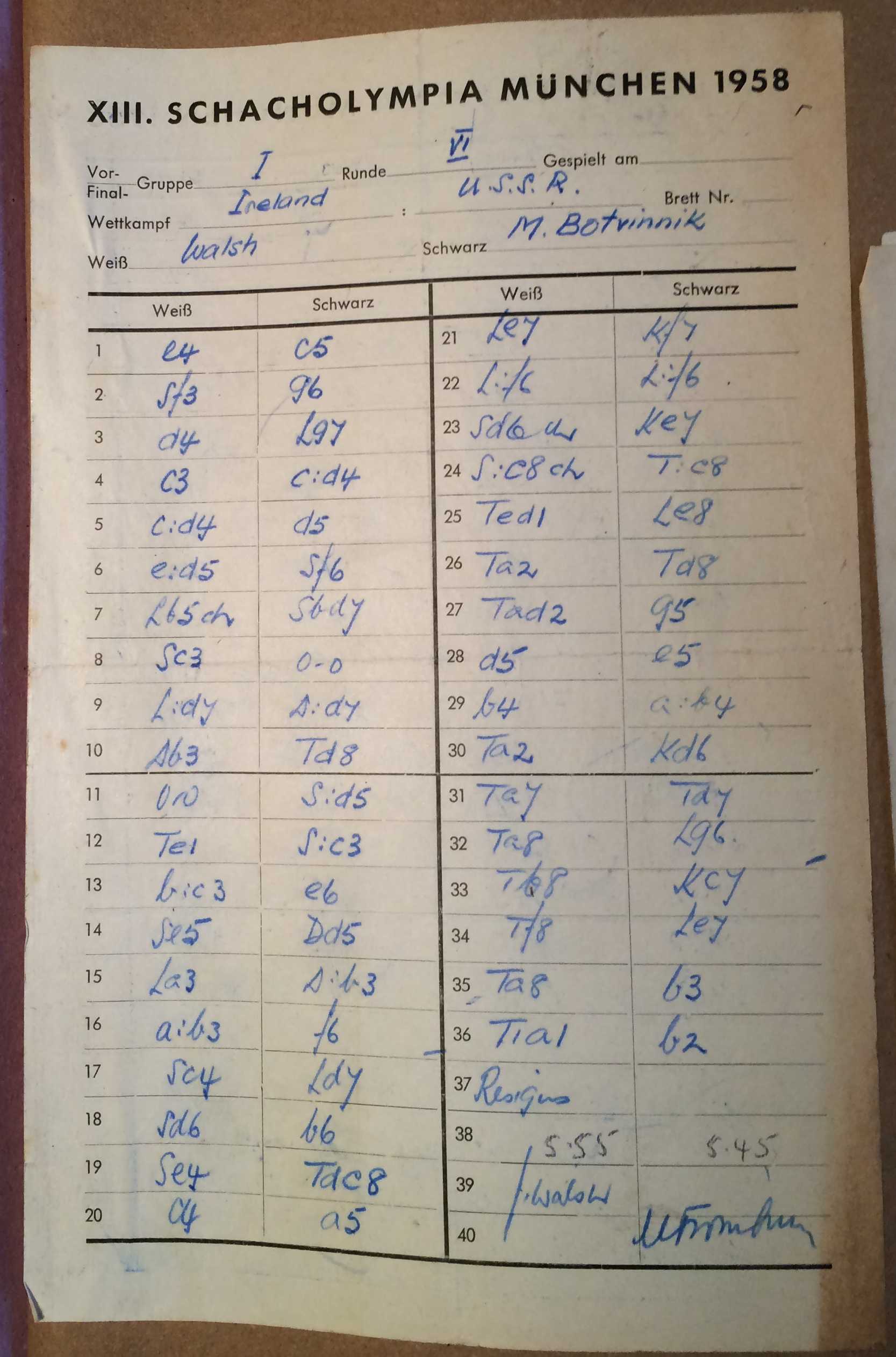It’s a rare honour for any amateur player to play a reigning world champion. How many Irish players can claim this distinction? The number must be very small.
One player who can is J. J. Walsh. And here is the evidence: the scoresheet signed by Botvinnik himself:
Ireland played the USSR in the preliminary rounds of the Munich Olympiad 1958. Botvinnik had regained the world championship title earlier that year, winning his return match against Smyslov. [Click to play through the full game.]


yes it was a great achievement… The game itself perhaps highlighted the gulf in class as any average strength player would never go in to giving up a rook for 2 pieces nevermind a rook for 2 bishops! I stopped watching the game after move 24. (that said it must have been a daunting experience playing the world champion and I am sure that had an effect.)
I believe there was another Irish player (Keirnan) that played Karpov when he was world champion and gave a very good account of himself in that game…it made it into Karpovs “my 500 best games” and from memory (I read the book once) Karpov said that Kiernan was a very dangerous opponent and in the game that Kiernan sacced a piece for 2 pawns and that Karpov had to play very accurately to circumvent the dangers for a long time before he emerged with an advantage! mind you Kiernan was a 2400 player and JJ Walsh was perhaps a 2200 player so JJ’s achievement in playing a world champion is all the more impressive in that regard!
The scoresheet raises another interesting point actually – there’s a (to me) surprising number of Irish players who use foreign lettering when writing their moves down (even down to the : instead of x for a capture). I once played an Irish player who wrote his moves down in Czech – when I asked afterwards, he said (possibly in jest!) that this was to confuse and possibly distract his opponent during the game.
Anyone out there who writes their moves in a different language able to elaborate as to the whys?
For my part, I only use algebraic notation in time trouble, when I write my moves in Irish. Just trying to be different I guess! It has actually proven quite confusing for some players copying moves down after the game has finished though. Partially the effects of the heat of the battle wearing off.
Kevin, algebraic is a requirement for all FIDE-rated events, and has been for a long time (since 1980 or so?). JJ Walsh was clearly well ahead of the trend: I recall him saying that he was a regular reader/subscriber to German magazines such as Schach-Echo, and that prompted him to follow their style. I think I understand the reasoning: using certain notation can put you in a slightly different frame of mind.
I know algebraic is a requirement – I write in slightly elongated algebraic (F1-C4), which doesn’t include the piece name. Only in time trouble do I change that to Ec4. Which so far as I’m aware is still within the rules.
(Though I have to admit I never understood why the English annotation was banned. I find it a bit confusing, but it’s perfectly suitable for its purposes. It just seems a bit intolerant to ban it outright)
An interesting aspect of the game is the approach taken by a much-stronger player, playing Black, against a much weaker opponent. Botvinnik does not avoid simplification, indeed seems to invite it, and was presumably intending to outplay his opponent in a Queenless endgame, before his opponent imploded. A lesson worth noting, where stronger players can sometimes be found trying to blow away ostensibly weaker opposition, instead often then going astray themselves.